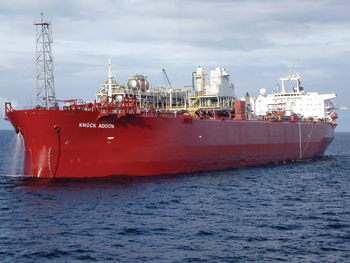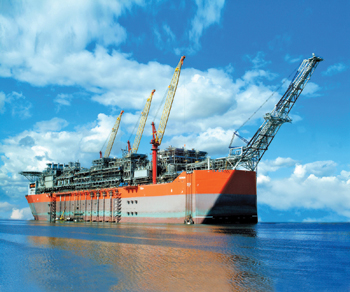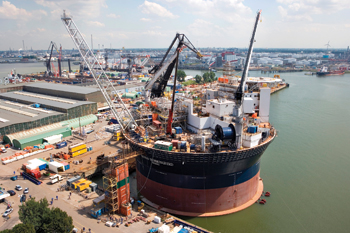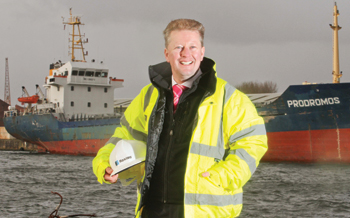
 Yinson ... strong order book
Yinson ... strong order book
RISING demand for production assets in the oil and gas (O&G) sector bodes well for Yinson Holdings, which is now the sixth largest floating production, storage and offloading (FPSO) player in the world after it recently completed the takeover of Norway-based Fred Olsen Production (FOP) in a RM576 million ($180.6 million) deal.
Analysts say Yinson’s purchase of FOP is timely as demand for FPSOs especially is expected to be robust following intense drilling activities by O&G majors over the last few years.
FPSOs are floating oil production facilities that receive and process raw oil from offshore platforms. The oil is stored in the vessel and then offloaded onto a tanker or into a pipeline.
“During the 2008-09 global financial crisis, oil prices dropped to $30 per barrel. Most of the projects became unfeasible and O&G majors shelved their production plans and the development of oilfields,” Yinson CEO Lim Chern Yuan says in a report.
“But oilfields became feasible again in 2010 after oil prices recovered, and when more drilling started to take place, demand for rigs grew. O&G companies drilling oilfields are bound to look for FPSO operators for their production phase, which is where we come in,” he adds.
There is also less competition among FPSO players, says Yuan or CY as he is more popularly known, because their number in the world has dropped to 12 from 40 previously after going through the initial phase of bad investments and speculation about floating units in the industry.
Buoyed by the prospects of high demand for FPSOs and the purchase of FOP, Yinson’s shares have almost tripled in value since June last year, when it first announced the takeover of FOP. The shares have risen from their RM3 level less than eight months ago and closed at RM8.64, putting the company’s market capitalisation at RM2.22 billion.
Yinson, which was established in Johor and helmed by Lim’s father Han Weng, has grown by leaps and bound since 2011 when it secured its first major O&G contract – a floating storage and offloading (FSO) vessel charter with Vietnam’s national oil company PetroVietnam. Its shares were trading at about RM1 then.
The Lim family controls 46.15 per cent of Yinson while Datuk Mokhzani Mahathir’s Kencana Capital holds an 18.5 per cent stake that came largely from a private placement exercise last year.
“Post-acquisition of FOP, Yinson owns and operates four FPSOs, hence becoming the sixth largest FPSO player in the world behind Bumi Armada Bhd, which owns six FPSOs. In the domestic market, Yinson is the second largest FPSO player after Bumi Armada,” writes UOB Kay Hian in a recent report.
Apart from FPSOs, deemed big-ticket items, Yinson also owns a newly constructed FSO, a platform support vessel, two anchor handling tug supply vessels, four tug boats, two deck cargo barges and one general cargo, and manages a mobile offshore production unit (MOPU), the brokerage firm says.
Consensus estimates put Yinson’s FY2015 ending January 31 net profit at RM125 million, reflecting the full-year earnings of FOP’s three FPSOs that are operating in West Africa and the six-month earnings of a Yinson-PetroVietnam FPSO – which is being converted from a tanker in Singapore now – that is to be deployed in the second half of the year.
With earnings projected to be RM125 million in FY2015, Yinson, with its market cap of RM2.22 billion, is priced at 17.6 times forward earnings, just like Bumi Armada, which has a market cap of RM11.55 billion.
“Note that there is also an upside for earnings from contract renewal and new contracts in the near term. Yinson intends to bid for mid-range FPSO projects valued at $250 million (RM828.5 million) to $700 million going forward,” says UOB Kay Hian.
Yinson’s 9MFY2014 net profit came in at RM41.16 million, an increase of 41.7 per cent from the previous corresponding period.
While Lim remains tight-lipped, industry sources say the company is confident of landing new jobs this year, which would require fresh investments in FPSOs. It is worth noting that Yinson has the right of first refusal for any FPSO or FSO contracts from PetroVietnam. This helps ensure a pipeline of contracts for the company.
“We are definitely bidding for new jobs and if we win them, we will look to acquire production assets,” Lim says, adding that there is no need to pre-acquire FPSOs as there is an oversupply of tankers for conversion. Also, O&G majors require custom-built units tailored to certain specifications today.
In the meantime, Yinson has proposed a rights issue to raise up to RM500 million in proceeds. Coupled with stronger earnings, the rights issue would strengthen the group’s shareholders’ funds to about RM1 billion and pare its net gearing to a ratio of about one by the end of FY2015 from 2.5 times following the purchase of FOP.
According to Yinson, the funds borrowed to finance the FPSOs were not consolidated into its books as this was off-balance-sheet project financing backed by cash flow from long-term charters.
On future jobs, Lim says the internal rate of return will have to be equal to, if not better than, that of Yinson’s existing charters. “We also have very strict criteria where we should be able to recover our investment (in the FPSO or FSO) within the firm contract period.”
According to UOB Kay Hian, Yinson’s order book during the firm period of its contracts stands at US$1.2 billion with an additional US$1.2 billion during the optional period.
“Today, we are bidding for jobs relying on our own strength, our own technical capabilities and our own team, which is very different now. We are getting recognition from international oil companies,” says Lim, comparing Yinson to a few years ago when it had only one FSO and one FPSO, which were not sizeable enough for the company to groom its own engineering, design and technical team.
He adds that with FOP, the group can bid in the global market and has grown its client base from Asia to Africa. FOP is well established in West Africa while most of Yinson’s projects are in Vietnam.
“Our outfit in its current form and our track record will enable us to attract clients with good credentials, resulting in a strong order book and visibility that will instil confidence in our clients,” he says.
According to UOB Kay Hian, oil prices above $90 per barrel will act as a catalyst for oil majors to continue to spend on producing oil and gas. “This bodes well for Bumi Armada and Yinson as their assets are used during the production cycle. Furthermore, FPSO/FSO contracts, which are long term in nature, offer good earnings visibility.”
Datuk Mokhzani Mahathir says that he is not joining the board of Yinson Holdings, quashing the rumour that has been circulating in the market since he relinquished his executive position in SapuraKencana Petroleum Bhd on Feb 1 and trimmed his interest in the company last week.
He also says he is not planning to exit SapuraKencana, where he is currently non-executive vice-chairman.
“I am fully aware that I have a duty to SapuraKencana and as a significant shareholder, I will continue to protect SapuraKencana’s interests, which means protecting my own interests,” he says, adding that the recent share disposal was to raise cash for new investments.
Mokhzani still has a 10.26 per cent stake in SapuraKencana after selling 190.3 million shares or a 3.2 per cent stake in the company last week for a total of RM818.3 million through private vehicle Khasera Baru, of which the family of the late Chong Hin Loon is also a shareholder.
“I will maintain a more than 10 per cent shareholding in SapuraKencana as I still believe it will go higher based on the news we’ve announced lately.”
Mokhzani’s paring of his equity interest in SapuraKencana coincided with a spike in Yinson’s shares last week as rumours swirled that he may beef up his role in the latter, which owns a fleet of floating production, storage and offloading (FPSO) vessels that serve oil and gas majors.
It was reported last year that Mokhzani had a falling-out with the SapuraKencana board over his investment in Yinson, which was done without the board’s knowledge.
This happened after Kencana Capital Sdn Bhd, which is owned by Mokhzani and Yeow Kheng Chew (then also an executive director of SapuraKencana), emerged with an 18.51 per cent stake in Yinson following a share placement exercise. Yinson had placed out shares to Kencana Capital to help part-finance its acquisition of Norwegian FPSO player Fred Olsen Production ASA.
It was said that Tan Sri Shahril Shamsuddin – another of SapuraKencana’s substantial shareholders and its executive director, president and group CEO – and the board were not informed of the Yinson-Kencana Capital deal and that they felt that Mokhzani could have brought the deal to SapuraKencana’s attention. Nonetheless, Mokhzani was cleared of any conflict of interests by SapuraKencana’s board.
Mokhzani also says that he discussed his recent share disposal with the SapuraKencana board. “I agreed with Shahril and the SKPB board that I will sell down to just above 10 per cent.”
According to a filing with Bursa Malaysia, following Mokhzani’s disposal, Shahril is now the single largest shareholder of SapuraKencana with a 16.71 per cent stake.
Mokhzani’s shares are said to have been sold to seven government-linked investment companies. “One of them even tried to take the entire 192 million shares,” a source says.
The fact that Mokhzani and Yeow have given up their executive posts in SapuraKencana opens doors to other investment opportunities without creating any conflict of interests, says a market observer.
In the meantime, Yinson has proposed a rights issue to raise up to RM500 million in fresh funds and Kencana Capital’s portion could cost more than RM90 million.
According to Mokhzani, his involvement in the FPSO player is merely as an investor. “We are informed investors with strong knowledge of the industry and management occasionally seeks guidance from such investors.”
He adds that Yinson is in the right business, considering that oil and gas companies have found a cost-effective solution in outsourcing production to FPSO players.
“FPSO is a charter business with steady cash flow but high capital expenditure. Nevertheless, Yinson now has the expertise and assets after it took over Fred Olsen. The FPSO market will remain bullish over the next five years,” he says.












































































